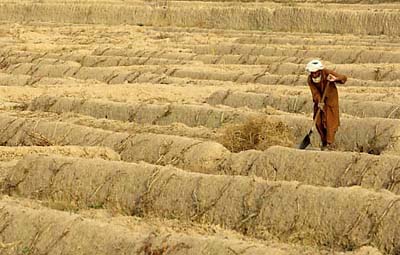This website was
created for a class entitled Genetically Modified Organisms at Davidson
College. This seminar fulfills a biology major requirement and is taught
by Dr. Karen Bernd. |
Stressed fields. Photo provided by msnbc.com (permission pending) This web site is an introduction to the abiotic stresses that plague plant growth. Extreme heat or cold conditions, high salinity, and drought are all serious stresses that affect plants - specifically agricultural crops. With no way to escape stress, plants must find ways to cope. Often, the stress becomes to much for the plant to handle, and the plant suffers growth, development, or reproduction problems. In the worst cases, plants may even die from exposure to these elements. Many plants are equipped with their own natural mechanisms for dealing with these stresses and there is current research involving new biotechnology that would provide even more assistance to these plants as well as extend stress tolerance to other species. Genetically modified plants are the future of agriculture. New technologies provide a means of inserting genes, deleting genes, or over expressing genes that help make plants more tolerant to stresses. There are still many who are wary of the use of genetically modified crops, but use of GMO's does offer great potential benefits to the agricultural sector. This web site offers an introduction to the four abiotic stresses: drought, salinity, heat, and chilling. There is also information regarding current research involving plant stress and genetic modification. The costs and benefits of genetic modification are also presented. Finally, a discussion involving the use of plant stress genes to fight cancer is included as an example of the great diversity of benefits that may spring from this research. Not only would plant stress gene insertion allow plants to be cultivated in areas of the world that were once thought to be infertile, but the possible benefits of plant stress genes may have applications in the fight against human cancer, as well. |
||||||
This website was created for a biology
course entitled "Genetically
Modified Organisms" at Davidson
College in Davidson, North Carolina. All questions and/or comments
should be directed to Amy Johnston
or Meghan Estes. Copyright
2002 |
